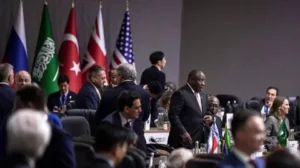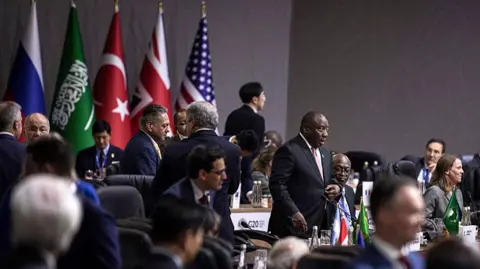The G20 summit in South Africa, which has recently concluded, marked a significant gathering of major economies, culminating in a joint declaration that emphasizes a commitment to “multilateral cooperation.” This year’s summit was particularly notable as it was the first time the G20 assembly took place on the African continent, with the city of Johannesburg hosting key figures from around the world. Notably, the declaration from the summit addressed pressing issues such as climate change and economic inequality, reflecting a collective effort by the member nations despite some significant dissent.
American President Donald Trump notably chose to boycott the summit, an action that was rooted in a widely discredited narrative regarding the plight of South Africa’s white minority, which Trump claimed was undergoing large-scale killings and land seizures. This decision raised eyebrows and prompted discussions about the implications of the U.S.’s absence at such a crucial global dialogue platform.
During the closing ceremony, South African President Cyril Ramaphosa highlighted the importance of shared objectives that transcended differences among nations involved. He stated that the spirit of collaboration exhibited at the summit reiterated the need for cooperative action against global challenges, demonstrating a united front despite the notable absence of the U.S. leader. Ramaphosa’s sentiments underscored the African nation’s role on the global stage and its ability to foster significant international dialogue.
In parallel, Brazilian President Luiz Inácio Lula da Silva downplayed the ramifications of President Trump’s absence, voicing that multilateralism was still very much alive in global discussions. His remarks pointed to an evolving geopolitical landscape where nations are finding new avenues for connection and collaboration, particularly in light of recent events.
The G20 summit had been presided over by Indonesia, India, and Brazil in previous years, making this gathering a critical opportunity for African nations to step into the spotlight and illustrate their capacities in international diplomacy. The U.S. is slated to host the next G20 summit in 2026, which is expected to take place at Trump’s golf course in Florida, a move that further intertwines personal and political spheres within international relations.
Interestingly, a ceremonial handover of the presidency regarding the G20, which was meant to occur at this summit’s conclusion, did not transpire as planned. Instead, it has been postponed and will likely involve a meeting of junior officials, further underlining the complexities inherent in international governance processes.
The summit also addressed current global conflicts, with a consensus reached on pursuing “just, comprehensive, and lasting peace” in regions including Ukraine, Sudan, and the Democratic Republic of Congo, as well as in the “Occupied Palestinian Territory.” The inclusion of Sudan as a focal point in the discussions was particularly significant, as noted by Sudanese commentator Saeed Abdalla, who remarked on how, for the first time, the conflict in Sudan gained recognition among the G20 discussions after years of neglect.
The impacts and outcomes of this summit are still reverberating within international circles, prompting discussions about the changing dynamics of global leadership and cooperation. The commitments made at this gathering might shape future diplomatic initiatives and shed light on how nations can work collectively to address shared challenges, despite the differing political landscapes and ideologies represented among the G20 members.
Overall, while Trump’s absence from the summit raised questions about the U.S.’s role in global governance, the event itself was marked by a strong show of unity and determination among the remaining member nations to pursue cooperation in addressing critical economic and social issues.











